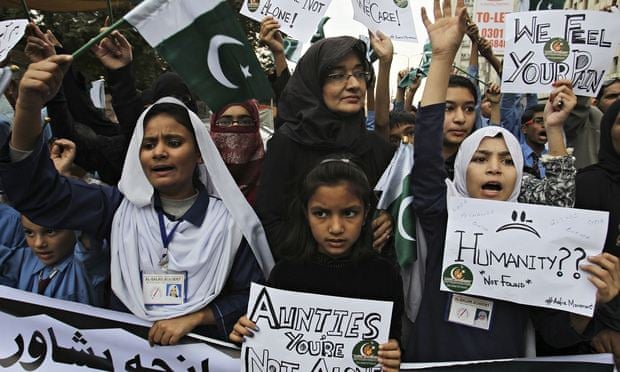
By Ali Dayan Hasan
Sadly, once the dust settles, it is likely the military will stick to the policies that ripped apart so many families
The Peshawar school massacre has given Pakistanis an unprecedented moment of unity. A country so deeply divided that even 40,000 deaths from terror attacks since 2001 could not create a shared sense of suffering has finally been brought together in horror.
It is tempting to believe that this is a moment of paradigm-shifting lucidity, that the country has woken up to the stark realisation that we cannot carry on with business as usual. After all, if the cold-blooded mass murder of your children does not give you clarity about the Taliban, nothing else can or should.
Yet, just a few days into our collective mourning, our shared revulsion is already fraying at the seams. Taliban-apologist clerics still enjoy airtime on television, pundits are beginning to point the finger away from domestic militants towardsIndia, and the sickening mantra of “Muslims could not possibly do this”, recited after so many other attacks, is resurfacing.
In the coming days, as anger gives way to the hard business of fighting the Taliban, and they in turn unleash further atrocities, the country’s myriad social and political fissures are likely to re-emerge through the anger and grief.
Our dirty, open “secret” is that the war against the Taliban is also Pakistan’s war within – a strategic, political, cultural and religious schism that creates an atmosphere of denial and myopia. We are unable and unwilling to look clearly at the nature and causes of the Islamist threat, or evaluate our own response rationally.
Prime Minister Nawaz Sharif has declared an end to decades of trying to differentiate between “good and bad” Taliban, until now a cornerstone of the country’s controversial national security policy. His political nemesis, Imran Khan, has grudgingly agreed to put his campaign to oust Sharif on the backburner to make common cause on the Taliban threat.
It remains to be seen whether this truce can endure, and even if it does, Pakistan’s cowardly political class is usually happy to play “blame the military” rather than grapple with anti-extremist efforts. But politicians are the least of Pakistan’s problems.
Above all, this is a moment of truth for Pakistan’s powerful military. Can it wage an effective war against the jihadi network it has created, while continuing to use elements of that system against its perceived enemies in India and Afghanistan? If not, would it really give up those carefully nurtured allies?
On this, the Pakistani military has disagreed with much of the world since 9/11, clinging to its policies even as its proxies turned first on Pakistani civilians, then on army officers and installations, and now on the children of military personnel.
Sadly, once the dust settles, it is likely the military will stick to the policies that ripped apart so many families in Peshawar last week. It may ratchet up its fight with the Pakistani Taliban but is unlikely to take off the kid gloves used for handling both their Afghan counterparts and its principal jidahi ally in India, Lashkar-e-Taiba. The world finds this duplicity galling. It is. But it is not just a function of a self-annihilating quest for power.
Support for Islamist extremism and the militancy that goes with it is a fault-line that runs through the length and breadth of the country, driven not just by fear, but religious conviction and social acceptance. Any all-out onslaught on the web of jihadi organisations would strain the state and risks turning the country’s heartland and its major cities into warzones.
An underlying fear, that Peshawar could become the bloody norm, drives a national security narrative that presents support for extremists as a sophisticated protection of national interests rather than what it really is, Stockholm syndrome affection for an organisation holding us all hostage.
There can be hope, if Pakistan’s allies and neighbours are willing to create a conducive environment for the country to wean itself away from “Jihad Inc”. Most urgently, Pakistan’s military needs to rework its understanding of the threat posed by India. But unless India acknowledges the centrality of a stable and strong Pakistani state to its own security imperatives, and can find the empathy to see Pakistan as a victim of terror (albeit of its own making), it is unlikely that Pakistan’s military will ever fully abandon its jihadist allies.
Pakistan’s perceived friends have emerged as its greatest enemies. The country has little hope of changing course for the better if its perceived enemies cannot learn to be its friends.

No comments:
Post a Comment